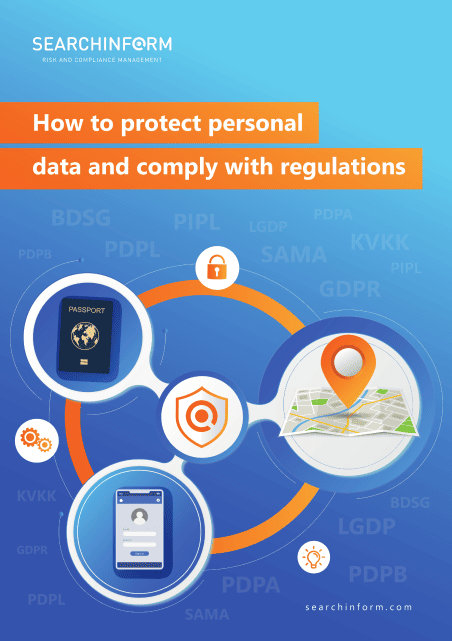Understanding CCPA Compliance:
Comprehensive Guide
- Introduction to CCPA Compliance
- Key Definitions
- Scope and Applicability of CCPA
- Who Needs to Comply?
- What Data is Covered?
- Rights Afforded to Consumers Under CCPA
- 1. Right to Know
- 2. Right to Opt-Out
- 3. Right to Deletion
- 4. Other Consumer Rights
- Compliance Requirements
- 1. Data Mapping and Inventory
- 2. Notice Requirements
- 3. Data Security Measures
- 4. Other Requirements
- Penalties for Non-Compliance
- 1. Fines and Enforcement Actions
- 2. Reputational Damage
- 3. Other Penalties
- Steps to Achieve CCPA Compliance
- 1. Conducting a Gap Analysis
- 2. Implementing Necessary Policies and Procedures
- 3. Training Employees
- 4. Other Steps
- Future Trends and Developments in CCPA Compliance
- 1. Amendments to CCPA
- 2. Evolution of Enforcement
- 3. Interplay with Global Privacy Regulations
- 4. Technology Solutions and Compliance Tools
- Impact of CCPA on Data Privacy Landscape
- 1. Proliferation of State-Level Privacy Laws
- 2. Heightened Consumer Awareness and Expectations
- 3. Business Adaptation and Compliance Investments
- Benefits of SearchInform Solutions in Achieving CCPA Compliance
Introduction to CCPA Compliance
The California Consumer Privacy Act (CCPA) stands as one of the most comprehensive data privacy laws in the United States. Enacted in 2018 and put into effect on January 1, 2020, CCPA grants California residents extensive rights over their personal information and imposes significant obligations on businesses handling such data. Its primary aim is to enhance consumer privacy rights and provide individuals with greater control over how their personal data is collected, used, and shared by businesses.
Key Definitions
To grasp the essence of CCPA compliance, it's crucial to understand several key definitions outlined within the legislation:
Personal Information: CCPA defines personal information as any data that identifies, relates to, describes, or is reasonably capable of being associated with a particular consumer or household. This includes but is not limited to names, addresses, email addresses, IP addresses, geolocation data, and browsing history.
Consumer: A consumer, according to CCPA, refers to any natural person who is a California resident, as defined in Section 17014 of Title 18 of the California Code of Regulations.
Business: In the context of CCPA, a business is any for-profit entity that collects consumers' personal information, determines the purposes and means of processing that information, operates in California, and satisfies one or more of the following thresholds: (a) has annual gross revenues exceeding $25 million, (b) annually buys, receives, or sells personal information of 50,000 or more consumers, households, or devices, or (c) derives 50% or more of its annual revenues from selling consumers' personal information.
Service Provider: Under CCPA, a service provider refers to any entity that processes personal information on behalf of a business and is bound by a contract to use such information solely for the purposes specified by the business, and not for any other purpose.
Understanding these fundamental definitions lays the groundwork for comprehending the scope and implications of CCPA compliance. As we delve deeper into CCPA regulations, we'll explore how businesses can navigate these requirements to ensure compliance while safeguarding consumer privacy rights.
Scope and Applicability of CCPA
The California Consumer Privacy Act (CCPA) introduces extensive regulations aimed at protecting the privacy rights of California residents and imposing obligations on certain businesses that handle their personal information.
Who Needs to Comply?
CCPA applies to a wide range of businesses that collect, use, or disclose personal information of California residents. Specifically, CCPA applies to businesses that meet any of the following criteria:
Revenue Threshold: Businesses with annual gross revenues exceeding $25 million.
Data Volume Threshold: Businesses that annually buy, receive, sell, or share for commercial purposes the personal information of 50,000 or more consumers, households, or devices.
Business Model Threshold: Businesses that derive 50% or more of their annual revenues from selling consumers' personal information.
It's important to note that CCPA applies regardless of where the business is physically located, as long as it collects personal information from California residents and meets any of the aforementioned criteria.
What Data is Covered?
CCPA defines "personal information" broadly to encompass various types of data that can be linked to or associated with an individual or household. Covered personal information includes, but is not limited to:
Identifiers: Names, aliases, postal addresses, unique personal identifiers (such as IP addresses or device identifiers), email addresses, account names, and social security numbers.
Commercial Information: Records of products or services purchased, obtained, or considered, as well as purchasing or consuming histories or tendencies.
Biometric Information: Physiological, biological, or behavioral characteristics that can be used for identification, such as fingerprints or facial recognition data.
Internet or Network Activity: Browsing history, search history, interactions with websites, applications, or advertisements.
Geolocation Data: Information about the physical location or movements of an individual or device.
Professional or Employment-Related Information: Job history, performance evaluations, or other employment-related data.
Education Information: Records or information related to a student's educational history or performance.
Understanding the breadth of personal information covered by CCPA is essential for businesses to assess their compliance obligations accurately. By identifying the types of data they collect and how they use it, businesses can take proactive steps to ensure compliance with CCPA regulations and protect the privacy rights of California residents.
Rights Afforded to Consumers Under CCPA
The California Consumer Privacy Act (CCPA) grants California residents robust rights regarding the collection, use, and disclosure of their personal information by businesses subject to the law.
1. Right to Know
California consumers have the right to request and receive information about the personal information that businesses collect, disclose, or sell about them. This includes the categories of personal information collected, the sources from which it was collected, the purposes for which it is used, and the categories of third parties with whom it is shared.
2. Right to Opt-Out
Consumers have the right to opt-out of the sale of their personal information by businesses. Businesses subject to CCPA are required to provide a clear and conspicuous "Do Not Sell My Personal Information" link on their website or mobile app, allowing consumers to exercise this right easily. Once a consumer opts out, businesses are prohibited from selling their personal information unless an exception applies, such as when the sale is necessary to complete a transaction requested by the consumer.
3. Right to Deletion
Consumers have the right to request the deletion of their personal information held by businesses subject to CCPA. Upon receiving a verifiable deletion request, businesses must delete the consumer's personal information from their records and direct any service providers to do the same, unless an exception applies, such as when the information is necessary for the business to perform certain functions, such as completing a transaction or providing a requested service.
4. Other Consumer Rights
In addition to the rights mentioned above, CCPA affords consumers several other important rights, including:
Right to Non-Discrimination: Consumers have the right not to be discriminated against for exercising their CCPA rights. Businesses are prohibited from denying goods or services, charging different prices, or providing a different level or quality of goods or services based on a consumer's exercise of their CCPA rights, unless such differentiation is reasonably related to the value provided to the consumer by their data.
Right to Opt-In for Minors: Businesses are required to obtain opt-in consent from minors aged 13 to 16 years old before selling their personal information. For minors under 13 years old, businesses must obtain opt-in consent from their parents or guardian before selling their personal information.
Understanding these rights empowers California consumers to take control of their personal information and make informed choices about how it is collected, used, and shared by businesses subject to CCPA. Businesses, in turn, must ensure compliance with CCPA requirements to respect and uphold these rights effectively.
Compliance Requirements
Compliance with the California Consumer Privacy Act (CCPA) entails several key obligations and requirements that businesses must fulfill to ensure the protection of consumer privacy rights and avoid penalties for non-compliance.
1. Data Mapping and Inventory
Businesses governed by CCPA must undergo comprehensive data mapping and inventory processes to meticulously identify and document the personal information they handle. This involves pinpointing the various sources from which personal data is gathered, ranging from websites and mobile applications to customer interactions and third-party affiliations. Additionally, companies must categorize the types of personal information amassed, including identifiers, biometric data, and internet activity, among others. Furthermore, it's imperative to map out the trajectory of personal data throughout the organization, delineating how it's acquired, stored, processed, and disseminated to external entities. Through these meticulous procedures, businesses can ensure compliance with CCPA mandates and uphold the privacy rights of individuals.
2. Notice Requirements
Under CCPA regulations, businesses are mandated to furnish consumers with transparent and comprehensive notifications concerning their data collection and processing practices. These notification requirements encompass various facets:
Firstly, maintaining an updated privacy policy is essential. This policy should explicitly outline the categories of personal information gathered, the intended purposes for its utilization, and the categories of third parties with whom it may be shared.
Secondly, at-collection notices must be provided to consumers either at or before the point of data collection. These notices serve to inform individuals of the specific categories of information being collected and the intended purposes for its usage.
Lastly, including a prominently displayed "Do Not Sell My Personal Information" link on the business's website or mobile application is imperative. This enables consumers to exercise their right to opt-out of having their personal information sold to third parties. By adhering to these notice requirements, businesses can uphold transparency and compliance with CCPA regulations while respecting consumer privacy rights.

3. Data Security Measures
CCPA mandates that businesses must establish reasonable security measures to protect the personal information they handle. These measures encompass various aspects:
Firstly, implementing access controls is essential. This involves restricting access to personal data to authorized personnel only and employing user authentication mechanisms to verify user identities.
Secondly, encryption plays a crucial role in data security. Encrypting personal information during transmission and while stored ensures protection against unauthorized access or interception, thereby safeguarding sensitive data from potential breaches.
Lastly, data minimization is paramount. This principle entails limiting the collection, retention, and utilization of personal information to the extent necessary for the stated purposes. By minimizing the volume of data collected and stored, businesses reduce the risk of exposure and enhance overall data security compliance with CCPA requirements.
4. Other Requirements
Furthermore, businesses under the purview of CCPA must:
- Facilitate Consumer Requests: Develop streamlined procedures for receiving and addressing consumer requests pertaining to access, deletion, or opting out of personal information sale.
- Training and Awareness Initiatives: Deliver comprehensive training sessions to staff on CCPA mandates, coupled with the implementation of internal policies and protocols to foster compliance.
- Effective Vendor Oversight: Ensure that agreements with third-party service providers contain pertinent clauses outlining personal information handling practices and adherence to CCPA guidelines.
By adhering to these compliance requirements, businesses can enhance consumer trust, mitigate legal risks, and demonstrate their commitment to respecting consumer privacy rights under CCPA.
Penalties for Non-Compliance
Non-compliance with the California Consumer Privacy Act (CCPA) can result in significant penalties and repercussions for businesses subject to the law. Understanding the potential consequences of non-compliance is essential for businesses to prioritize CCPA compliance efforts and mitigate associated risks effectively.
1. Fines and Enforcement Actions
CCPA entrusts the California Attorney General (AG) with enforcement authority, empowering them to impose civil penalties for infractions of the law. In cases of non-compliance, the AG can initiate civil actions against offending businesses, pursuing both injunctive relief and monetary fines. The severity of fines varies depending on the nature and gravity of the violation but can be substantial. For instance, businesses found in breach of CCPA may incur fines of up to $2,500 per violation for unintentional transgressions and up to $7,500 per violation for intentional misconduct. Additionally, the AG may pursue enforcement actions such as seeking injunctive relief to compel businesses to adhere to CCPA mandates effectively. These enforcement mechanisms underscore the significance of maintaining CCPA compliance to mitigate legal risks and uphold consumer privacy rights.
2. Reputational Damage
Non-compliance with CCPA can have far-reaching consequences, including significant reputational damage for businesses, which can profoundly affect consumer trust and brand reputation. With consumers increasingly cognizant of their privacy rights, they expect businesses to handle their personal information with responsibility and transparency. Failure to meet CCPA requirements can result in negative publicity, diminished customer confidence, and tarnished brand reputation. Businesses risk facing backlash from consumers, advocacy groups, and media outlets, thereby exacerbating reputational harm. Rebuilding trust with consumers post-data privacy incidents or CCPA violations can be arduous and may necessitate substantial investments in remediation efforts and communication strategies to regain consumer trust and restore brand credibility.
3. Other Penalties
Aside from fines, enforcement actions, and reputational harm, failure to comply with CCPA can yield further adverse repercussions for businesses. These include legal liability, as non-compliance may subject businesses to civil litigation initiated by affected consumers or class-action lawsuits aiming to secure damages for privacy infringements. Moreover, addressing compliance shortcomings and rectifying data privacy breaches can disrupt business operations, resulting in increased costs and resource allocation. Furthermore, non-compliance may translate into missed opportunities for businesses, as they risk being excluded from the California market or potential partnerships with other entities that prioritize data privacy compliance. These consequences underscore the importance of prioritizing CCPA compliance to mitigate risks and uphold consumer privacy rights effectively.
Given the potential penalties and repercussions of non-compliance, businesses subject to CCPA should take proactive measures to understand their obligations under the law, implement robust compliance programs, and prioritize data privacy and security practices to safeguard consumer information effectively.
Steps to Achieve CCPA Compliance
Achieving compliance with the California Consumer Privacy Act (CCPA) requires a structured approach and comprehensive implementation of policies, procedures, and training initiatives. Below are the key steps businesses can take to ensure CCPA compliance:
1. Conducting a Gap Analysis
Initiate the compliance journey by first assessing current practices. Evaluate existing data collection, processing, and sharing procedures to pinpoint areas where they may fall short of meeting CCPA requirements. Proceed to identify compliance gaps by conducting a thorough gap analysis, covering aspects such as data mapping, notice requirements, data security measures, and consumer rights processes. Document the outcomes of this analysis, meticulously recording identified compliance deficiencies, potential risks, and areas for improvement.
2. Implementing Necessary Policies and Procedures
Moving forward, the implementation of necessary policies and procedures is crucial. This involves updating privacy policies and notices to align with CCPA stipulations, ensuring comprehensive disclosure of data collection practices, the purposes for utilizing personal information, and outlining consumer rights. Establish data retention policies specifying the duration for which personal information will be retained, along with the criteria governing retention periods. Develop procedures for managing consumer requests, covering processes for knowing, deleting, or opting out of the sale of personal information, including verification protocols and response timelines. Lastly, prioritize data security by implementing reasonable measures to safeguard personal information from unauthorized access, disclosure, alteration, and destruction. Through these steps, businesses can proactively align with CCPA requirements, enhance data privacy practices, and establish a robust foundation for compliance.
3. Training Employees
Initiate a robust CCPA awareness program by offering comprehensive training sessions to employees. These sessions should cover various aspects of CCPA requirements, emphasizing the significance of data privacy, consumer rights, and their individual roles and responsibilities in ensuring compliance. Provide detailed training on proper data handling procedures, encompassing data collection, processing, storage, and sharing practices, alongside guidelines for addressing consumer requests promptly and effectively. Additionally, educate employees on recognizing and responding to data privacy incidents through specialized incident response training. Equip them with the necessary knowledge and protocols for promptly reporting incidents and implementing measures to mitigate potential harm to affected individuals. By empowering employees with the requisite skills and knowledge, businesses can fortify their compliance efforts and uphold the principles of data privacy under CCPA regulations.
4. Other Steps
- Vendor Management: Begin by reviewing and revising contracts with third-party service providers to verify alignment with CCPA stipulations and to guarantee adequate safeguards for personal information.
- Regular Compliance Audits: Conduct periodic audits and evaluations to monitor adherence to CCPA mandates, pinpoint any emerging compliance risks or concerns, and enact corrective measures as needed to rectify deficiencies.
- Engage Legal Counsel: Seek guidance from legal professionals or privacy specialists to accurately interpret CCPA provisions, address intricate compliance matters, and maintain ongoing alignment with evolving regulatory standards.
- Stay Informed: Remain vigilant about developments in data privacy legislation and regulations, including updates to CCPA and accompanying guidance from regulatory bodies. Adapt compliance strategies accordingly to ensure continued compliance with evolving regulatory requirements.
By following these steps and implementing a comprehensive CCPA compliance program, businesses can effectively protect consumer privacy rights, mitigate compliance risks, and build trust with their customers and stakeholders.
Future Trends and Developments in CCPA Compliance
As the regulatory landscape surrounding data privacy continues to evolve, several trends and developments are expected to shape CCPA compliance in the future:
1. Amendments to CCPA
Anticipated amendments to CCPA may introduce additional requirements, clarify existing provisions, or address emerging challenges in data privacy regulation. Future amendments could include provisions related to data breach notification requirements, further definition of terms within the law, or adjustments to the scope of covered entities.
2. Evolution of Enforcement
With the California Attorney General ramping up enforcement efforts, including hiring additional staff and resources dedicated to CCPA compliance, businesses can expect increased scrutiny and enforcement actions. As enforcement matures, precedents set by enforcement actions and legal interpretations of CCPA provisions will provide further clarity on compliance obligations.
3. Interplay with Global Privacy Regulations
CCPA's impact extends beyond California, influencing data privacy practices nationwide and globally. Businesses operating internationally must navigate a complex web of data privacy regulations, including the General Data Protection Regulation (GDPR) in the European Union. The convergence of CCPA with other global privacy laws may lead to harmonization efforts or mutual recognition frameworks to streamline compliance for multinational businesses.
4. Technology Solutions and Compliance Tools
The demand for technology solutions and compliance tools to aid CCPA compliance efforts is expected to grow. Businesses will increasingly rely on automation, artificial intelligence, and data privacy management platforms to streamline data mapping, consent management, and consumer rights fulfillment processes. These tools will help businesses achieve operational efficiencies while ensuring compliance with CCPA requirements.
Impact of CCPA on Data Privacy Landscape
CCPA has already catalyzed significant shifts in the data privacy landscape, influencing both regulatory frameworks and business practices:
1. Proliferation of State-Level Privacy Laws
CCPA's enactment has spurred other states to propose and enact their own comprehensive data privacy laws. States such as Virginia, Colorado, and Nevada have introduced or passed legislation with similarities to CCPA, indicating a broader trend towards enhanced data privacy protections at the state level.
2. Heightened Consumer Awareness and Expectations
CCPA has raised awareness among consumers regarding their data privacy rights and expectations regarding how businesses handle their personal information. Consumers are increasingly vigilant about data privacy practices and are more likely to exercise their rights under CCPA, driving businesses to prioritize transparency and accountability in data handling.
3. Business Adaptation and Compliance Investments
CCPA has necessitated significant investments in compliance efforts by businesses subject to the law. Companies have revamped data governance practices, implemented new technologies, and allocated resources to ensure compliance with CCPA requirements. The compliance landscape continues to evolve as businesses adapt to regulatory changes and consumer demands for greater data privacy protections.
In summary, future trends in CCPA compliance will likely focus on legislative amendments, enforcement efforts, global alignment with privacy regulations, and technological advancements to facilitate compliance. The impact of CCPA on the data privacy landscape will continue to unfold as businesses, regulators, and consumers navigate the complexities of protecting personal information in an increasingly digital world.
Benefits of SearchInform Solutions in Achieving CCPA Compliance
Implementing SearchInform solutions can offer several benefits to businesses seeking to achieve CCPA compliance:
Data Discovery and Mapping: SearchInform solutions provide advanced capabilities for discovering and mapping personal data across the organization's IT infrastructure. By accurately identifying and categorizing personal information, businesses can establish a comprehensive understanding of their data landscape, facilitating compliance with CCPA's data mapping and inventory requirements.
Real-time Monitoring and Alerting: SearchInform solutions offer real-time monitoring and alerting functionalities to detect unauthorized access or data breaches promptly. By continuously monitoring data access and usage patterns, businesses can identify potential compliance risks and take proactive measures to mitigate them, helping to ensure compliance with CCPA's data security requirements.
Data Access Controls: SearchInform solutions enable businesses to implement granular access controls and permissions to restrict access to personal information based on role-based access policies. By enforcing strict access controls, businesses can minimize the risk of unauthorized data access or disclosure, thereby enhancing compliance with CCPA's requirements for ensuring consumer data privacy and security.
Audit Trail and Reporting: SearchInform solutions generate comprehensive audit trails and reporting capabilities, documenting all data access, usage, and modification activities within the organization. These audit trails provide valuable insights into data handling practices and facilitate compliance audits, enabling businesses to demonstrate adherence to CCPA's accountability and transparency requirements.
Incident Response and Remediation: In the event of a data leak or compliance incident, SearchInform solutions facilitate swift incident response and remediation efforts. By providing automated incident response workflows and forensic analysis capabilities, businesses can efficiently investigate and remediate compliance incidents, minimizing potential regulatory penalties and reputational damage associated with non-compliance with CCPA.
Continuous Compliance Monitoring: SearchInform solutions support ongoing compliance monitoring and assessment, enabling businesses to stay abreast of evolving CCPA requirements and regulatory changes. By continuously monitoring compliance status and identifying areas for improvement, businesses can maintain compliance readiness and adapt their compliance strategies to address emerging challenges effectively.
In summary, SearchInform solutions offer a comprehensive suite of capabilities to assist businesses in achieving CCPA compliance, including data discovery and mapping, real-time monitoring and alerting, data access controls, audit trail and reporting, incident response and remediation, and continuous compliance monitoring. By leveraging these capabilities, businesses can enhance their data privacy and security posture, mitigate compliance risks, and demonstrate their commitment to protecting consumer data in accordance with CCPA requirements.
Take proactive steps to safeguard your business and ensure compliance with CCPA regulations. Explore how SearchInform solutions can streamline your compliance efforts and protect consumer data privacy. Contact us today to schedule a demo and learn more about our comprehensive data security and compliance solutions.
Extend the range of addressed challenges with minimum effort
Company news
SearchInform uses four types of cookies as described below. You can decide which categories of cookies you wish to accept to improve your experience on our website. To learn more about the cookies we use on our site, please read our Cookie Policy.
Necessary Cookies
Always active. These cookies are essential to our website working effectively.
Cookies does not collect personal information. You can disable the cookie files
record
on the Internet Settings tab in your browser.
Functional Cookies
These cookies allow SearchInform to provide enhanced functionality and personalization, such as remembering the language you choose to interact with the website.
Performance Cookies
These cookies enable SearchInform to understand what information is the most valuable to you, so we can improve our services and website.
Third-party Cookies
These cookies are created by other resources to allow our website to embed content from other websites, for example, images, ads, and text.
Please enable Functional Cookies
You have disabled the Functional Cookies.
To complete the form and get in touch with us, you need to enable Functional Cookies.
Otherwise the form cannot be sent to us.

Subscribe to our newsletter and receive a bright and useful tutorial Explaining Information Security in 4 steps!

Subscribe to our newsletter and receive case studies in comics!







